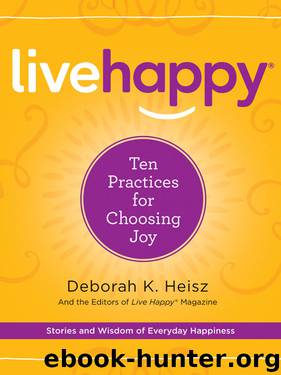Live Happy: Ten Practices for Choosing Joy by Deborah K. Heisz

Author:Deborah K. Heisz [Heisz, Deborah K.]
Language: eng
Format: epub, azw3
Publisher: HarperCollins
Published: 2016-03-22T06:00:00+00:00
Good for Your Relationships
Science makes it clear that gratitude is good for both physical and emotional health. Likewise, demonstrating thanks to the people in your life—whether they are family members, friends, or coworkers—has a measurable, positive effect on those relationships. The simple explanation for this is that a person who acknowledges and appreciates others is more likable. People enjoy being around people who are positive and kind. In contrast, we tend to avoid those who continually complain.
In relationships, both the way we respond to one another and why we respond the way we do can either strengthen or damage our bonds. For example, thanks given out of a sense of indebtedness, obligation, or quid pro quo can have a negative effect on the relationship—particularly in close or romantic relationships.
In a study titled “It’s the Little Things: Everyday Gratitude as a Booster Shot for Romantic Relationships,” researchers asked couples to track their feelings of gratitude and indebtedness daily. A sense of obligation to return a favor led to neutral or negative feelings toward the relationship, but a feeling of gratitude enhanced the way partners felt about each other and the relationship in general. Researchers noted: “Women’s increased feelings of satisfaction with the relationship and men’s increased feelings of connection to the partner and satisfaction with the relationship were predicted by gratitude felt on the previous day.” And the acts for which each felt grateful were “little things” like picking up their spouse’s favorite drink from Starbucks or giving the other a break of an hour or two from the children. The researchers concluded: “Gratitude may help to turn ‘ordinary’ moments into opportunities for relationship growth, even in the context of already close, communal relations.”7
That study and others reveal that gratitude is necessary for healthy relationships. Here’s the bad news—or the opportunity for improvement—people, in general, don’t say thank you enough to the people closest to them. In one survey, 90 percent of respondents said they were grateful for their families, but only 76 percent shared their gratitude with their children and even fewer, 49 percent, told their parents. At work, only 10 percent of those surveyed expressed thanks or appreciation for their colleagues. Nearly two-thirds of respondents said they never express gratitude at work, and 35 percent said that their bosses “never” thanked them.8
Studies show that gratitude at work can increase both productivity and happiness, so when we aren’t giving or receiving it, we’re shortchanging both ourselves and our coworkers.
Download
Live Happy: Ten Practices for Choosing Joy by Deborah K. Heisz.azw3
This site does not store any files on its server. We only index and link to content provided by other sites. Please contact the content providers to delete copyright contents if any and email us, we'll remove relevant links or contents immediately.
The Four Agreements by Don Miguel Ruiz(6744)
Flow by Mihaly Csikszentmihalyi(4684)
The Four Tendencies by Gretchen Rubin(4594)
Adulting by Kelly Williams Brown(4564)
You Do You by Sarah Knight(4464)
The Hacking of the American Mind by Robert H. Lustig(4369)
Ikigai by Héctor García & Francesc Miralles(4237)
Right Here, Right Now by Georgia Beers(4196)
A Simplified Life by Emily Ley(4156)
The Art of Happiness by The Dalai Lama(4120)
The Power of Positive Thinking by Norman Vincent Peale(4055)
The Little Book of Hygge by Meik Wiking(3677)
The French Women Don't Get Fat Cookbook by Mireille Guiliano(3651)
The Heroin Diaries by Nikki Sixx(3542)
The Courage to Be Disliked by Ichiro Kishimi & Fumitake Koga(3477)
The Choice by Edith Eva Eger(3467)
Why Buddhism is True by Robert Wright(3446)
Spark Joy by Marie Kondo(3296)
Make Your Bed by William H. Mcraven(3171)
